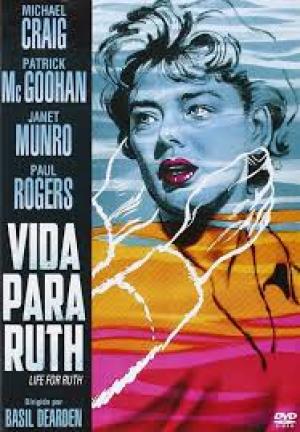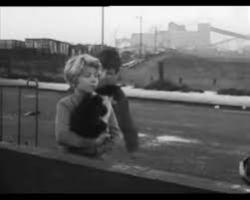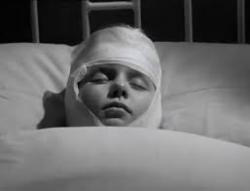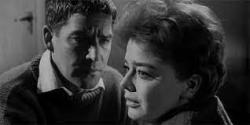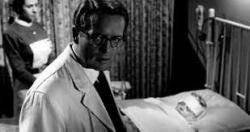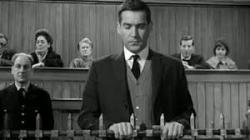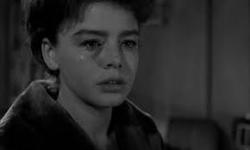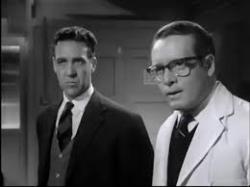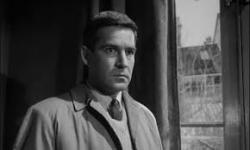Blood ties
By Michael J. Roberts
"The more intense the work, the happier that I am." ~ Patrick McGoohan
Basil Dearden was one of the more consistently reliable and interesting directors to work during the classic era of British film during and after the war. He got his start just prior to WWII and established himself with a series of fine efforts for Ealing and by the early 1960s was one of the premier British directors when he came to this unusual piece, a clash between science and religion over the death of a young girl in Life for Ruth. Michael Craig plays the father at the centre of the conflict and Patrick McGoohan plays the doctor attempting to hold him to account.
Ruth Harris (Lyn Taylor) is a happy 8-year old child with doting parents Pat (Janet Munro) and John (Michael Craig) and is injured in a boating accident in their seaside town. John goes to save his daughter but opts to save her young friend Teddy first before returning for his now stricken daughter. The parents are informed at the hospital by Doctor Brown (Patrick McGoohan) that Ruth needs a blood transfusion to save her life, but John is a devout Christian in an unnamed sect (read Jehovah’s Witnesses) who refuses to give permission on religious grounds. With very little time to waste Pat tries and fails to talk her husband round to saving their daughter, then defiantly rushes to the hospital to give her permission but arrives too late. The disgusted Doctor Brown has John charged with manslaughter and takes him to court to punish him for his choice of God over the life of Ruth.
In taking on the vexed subject of science versus religion, Dearden took to the controversy head on. The film looks like a bleak entry in the then burgeoning British New Wave, even if Dearden was too established in the old system to be considered a member of the new cinema push like Karel Reisz and Tony Richardson. The piece pulls no punches in examining both the terror and regret in the perplexed father, the utter confusion in the mother and the fury in the righteous physician, all of them driven by various levels of grief for the life of the young girl. The films downbeat mood is perfectly reflected in the sombre tones of cinematographer Otto Heller, who made a superb black and white film that could easily match any Brit Noir from the time. Heller was a talented Czech technician who fled the Nazi’s and found a welcoming home in the UK – he was equally adept at colour (Laurence Olivier’s Richard III, Michael Powell’s Peeping Tom) as black and white – Cavalcanti’s I Became a Fugitive and Dearden’s Victim.
Patrick McGoohan is his usual intense self and is brilliantly cast as the outraged doctor who is intent on giving the dead girl some sort of justice, but he must wrestle with the notion that he’s doing it for himself as much as anyone else. The film is almost stolen out from under him by the lovely performance of Janet Munro as the grieving mother and the understated portrayal from Michael Craig as the tormented father. Janet Munro, who had rose to prominence as a young actress under a Disney contract was to sadly pass away prematurely at age 38. The versatile Michael Craig had mostly been known for comedies up until that point, but had worked for Dearden some years prior in the crime drama Sapphire and was the epitome of the solid, reliable jobbing English actor - He later moved to Australia and had a solid late career there, mostly in TV.
The remarkable thing (even from the distance of the 21st century) about Life For Ruth is, of course, the controversial topic. Dearden doesn’t shy away from the taboo nature of examining religious belief at a time when religion held much more societal power and cultural sway. The sexual revolution, Second Wave Feminism and the counterculture of the 1960s were all still to come and jolly old England had yet to experience Beatlemania and Swinging London – this was very much a traditional England that supported the status quo of church and state. The passionate arguments from the Doctor appear as reasonable and obvious in a modern, more secular world, but would have been seen to be intrusive and disrespectful to the core beliefs of Ruth’s parents at the time. Dearden fully delineates the position of the faith minded father to give balance and respect, but it is in the passion and logic of the Doctor that the film crackles and sparks.
The other subject that suffuses a neat subtext is the unequal power in the marriage, where the woman is routinely expected to follow the dictates of her husband. Janet Munro’s mother finds a steely determination to disagree with her husband and try to save their daughter. She finds an independence and a greater determination to have her voice heard, but at a great cost – it’s a heartbreaking and deeply human angle that humanises both parents and makes it hard not to have some empathy for them as people if not the father’s extreme position. The score from William Alwyn is nicely understated and fits the sombre nature of Dearden’s thoughtful textures and framings.
Dearden was no stranger to controversial topics and of the many films he’d produced with his partner Michael Relph, they’d recently enjoyed a big commercial success the previous year with Victim, a brave film confronting the taboo issue of homosexuality, starring Dirk Bogarde. They followed it with All Night Long, a modern day retelling of Othello starring Patrick McGoohan as Johnny Cousin (Iago) with the tale of Shakespeare’s Moor set in the early ‘60s Jazz Scene of London and featuring jazz giants Dave Brubeck, Charles Mingus and John Dankworth in a rare celluloid performance with McGoohan’s intense, neurotic drummer stealing the acting honours.
Basil Dearden, along with other significant talents from the classic era of British cinema, like Robert Hamer, Ronald Neame and Anthony Asquith probably belongs in the second tier of great British directors, after the revered quartet of Hitchcock, Lean, Reed and Powell and his body of work is long and impressive, if very uneven. He would continue to make interesting films until his premature death at age 60 in an automobile accident in 1971. The primary interest in Life For Ruth may be the unusual topic, but Dearden does a fine job in bringing it to life, extracting wonderful performances from a fine cast and incorporating and dissecting the mores and standards of the time which gives us a valuable window into a little explored but fascinating subculture.
